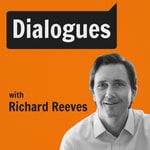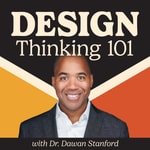Dialogues with Richard Reeves – Details, episodes & analysis
Podcast details
Technical and general information from the podcast's RSS feed.

Dialogues with Richard Reeves
Richard V. Reeves
Frequency: 1 episode/11d. Total Eps: 37

Recent rankings
Latest chart positions across Apple Podcasts and Spotify rankings.
Apple Podcasts
🇫🇷 France - philosophy
13/07/2025#100🇫🇷 France - philosophy
12/07/2025#81🇫🇷 France - philosophy
11/07/2025#60🇫🇷 France - philosophy
10/07/2025#48🇫🇷 France - philosophy
17/06/2025#88🇫🇷 France - philosophy
16/06/2025#77🇫🇷 France - philosophy
15/06/2025#63🇫🇷 France - philosophy
14/06/2025#48🇬🇧 Great Britain - philosophy
20/05/2025#91🇺🇸 USA - philosophy
08/05/2025#95
Spotify
No recent rankings available
Shared links between episodes and podcasts
Links found in episode descriptions and other podcasts that share them.
See all- https://mastersofscale.com/
574 shares
- https://www.oliverburkeman.com/
88 shares
- https://dressforsuccess.org/
85 shares
- https://twitter.com/oliverburkeman
27 shares
- https://twitter.com/JonHaidt
23 shares
- https://twitter.com/hboushey46
5 shares
RSS feed quality and score
Technical evaluation of the podcast's RSS feed quality and structure.
See allScore global : 52%
Publication history
Monthly episode publishing history over the past years.
Robert Tracy McKenzie on democracy for sinners
Episode 31
lundi 30 mai 2022 • Duration 55:03
"The main reason we find it difficult to think critically about democracy is that it requires us to think critically about ourselves." That's the view of my guest today, Robert Tracy McKenzie, a historian at Wheaton College. In his recent book We the Fallen People: The Founders and the Future of American Democracy , he argues that Americans - and American Christians in particular have forgotten what the framers always knew: that human beings are flawed, broken, inclined towards sin - in other words, fallen. He contrasts this view of fallen humanity with what he calls the "democratic gospel", based on the "comforting fiction that we are naturally good". In this conversation we discuss the development of the idea that "America is great because America is good" (which Tocqueville never actually said); argue about the extent to which democracy is intrinsically good, or mostly good as means to other ends; discuss the balance between two different Christian anthropologies, one positive one negative; the use and misuse of history by political partisans; and the need for religious people, in particular, to take history more seriously. He's an interesting thinker, a terrific writer and this was a fun conversation.
(Robert) Tracy McKenzie
McKenzie is a Professor of History at Wheaton College, where he holds the Arthur F. Holmes Chair of Faith and Learning. He blogs about Christian faith and American History at faithandamericanhistory.wordpress.com
Yascha Mounk on race, democracy and liberal patriotism
Episode 30
lundi 16 mai 2022 • Duration 01:12:06
Diverse democracies are new, wonderful, but potentially fragile: that's the claim, the promise and the warning from my guest today, Yascha Mounk. Yascha wears many hats. He is a Professor at Johns Hopkins, the Founder of Persuasion, a publication and community devoted to the maintenance of a liberal society, and host an excellent podcast, The Good Fight. Also a political scientist and historian with four books to his name, most recently The Great Experiment - Why Diverse Democracies Fall Apart and How They Can Endure, which is the main topic of our conversation today.
We talk about the dangers of tribalism and majority domination in diverse democracies; the difference between a liberal society and a democratic society (and which is more important), the intrinsic "groupiness" of human beings and how that means liberals need to be in the business of drawing lines between groups (whether they like it or not), what the communitarian critics of liberalism get wrong, the wonderful messiness of liberal societies, Federalist 10, and the risks of an overemphasis on racial or ethnic identity, or "racecraft", which is an increasingly dominant trend on both the political right and the political left.
Yascha Mounk
Yascha tweets from @Yascha_Mounk
Check out his work at his website here.
Buy his latest book, The Great Experiment here.
Born in Germany to Polish parents, Yascha received his BA in History from Trinity College Cambridge and his PhD in Government from Harvard University. He is an Associate Professor of the Practice of International Affairs at Johns Hopkins University, where he holds appointments in both the School of Advanced International Studies and the SNF Agora Institute. Yascha is also a Contributing Editor at The Atlantic, a Senior Fellow at the Council on Foreign Relations, and the Founder of Persuasion.
Anne-Marie Slaughter on progressive patriotism
Season 1 · Episode 1
lundi 29 novembre 2021 • Duration 01:08:08
Anne-Marie Slaughter is an optimist, and a patriot, and an advocate for both personal and national renewal. We talk about the difference between renewal and both reinvention (out with the old) and restoration (back in with the old), and what it means for our politics. We also discuss her work on women, men, families and equality, almost a decade on from her famous essay “Why Women Still Can’t Have it All”; the need for more grace in both our public and private life; why we should be “calling in” in private, rather than “calling out” in public; the lessons in leadership from her role as head of the New American think-tank; the past and future of feminism; our long overdue reckoning on racial justice; how to prepare for the 250th birthday of our country; and the unique power of women after the menopause. Enjoy!
Anne-Marie Slaughter
Anne-Marie Slaughter is the CEO of New America and Bert G. Kerstetter '66 University Professor Emerita of Politics and International Affairs at Princeton University. From 2009–2011, she served as director of policy planning for the United States Department of State, the first woman to hold that position. Prior to her government service, Anne-Marie was the Dean of Princeton University's School of Public and International Affairs (formerly the Woodrow Wilson School) from 2002–2009 and the J. Sinclair Armstrong Professor of International, Foreign, and Comparative Law at Harvard Law School from 1994-2002.
In 2012 she published the article “Why Women Still Can’t Have It All,” in the Atlantic, which quickly became the most read article in the history of the magazine and helped spawn a renewed national debate on the continued obstacles to genuine full male-female equality. Her books include Unfinished Business: Women, Men, Work, Family (2015), The Chessboard and the Web: Strategies of Connection in a Networked World (2017), and her latest, Renewal: From Crisis to Transformation in Our Lives, Work, and Politics (2021). Foreign Policy magazine named her to their annual list of the Top 100 Global Thinkers in 2009, 2010, 2011, and 2012. She received a B.A. from Princeton, and M.Phil and DPhil in international relations from Oxford.
The Dialogues Team
Creator: Richard Reeves
Artwork: George Vaughan Thomas
Tech Support: Cameron Hauver-Reeves
Music: "Remember" by Bencoolen (thanks for the permission, guys!)
Ayaan Hirsi Ali on the price of liberty
Season 1 · Episode 1
lundi 22 novembre 2021 • Duration 01:03:37
My guest today, Ayaan Hirsi Ali, is one of the most important intellectuals working today on issues of free speech, human rights, feminism and foreign policy. She is no stranger to either controversy or danger, not least because of her fierce criticism of Islam and Islamic culture. We discuss her own journey from Somalia to Saudi Arabia, via asylum in Holland to escape an arranged marriage, and finally to an academic career in the U.S. We also trace her psychological journey from a tribal mindset to a zealous religious worldview, and finally to a fiercely-held liberalism. We discuss the limits of Islamic liberalization, the contest for free speech, critical race theory, the state of intellectual and academic debate, the risks of self-censorship, and much more besides. We also discuss her latest book, Prey: Immigration, Islam, and the Erosion of Women’s Rights (2021). We don’t agree on everything, of course, but as she says: “That’s the whole point!”
Ayaan Hirsi Ali
Ayaan is a former Member of the Dutch Parliament (2003-2006) and is now a Research Fellow at the Hoover Institution at Stanford University, and Founder of the AHA Foundation. She has written several books including Infidel (2007); Nomad (2010); Heretic (2015); and The Challenge of Dawa (2017). Her newest book Prey is available now. She also has her own podcast, the Ayaan Hirsi Ali Podcast.
More Ayaan
- Prey: Immigration, Islam, and the Erosion of Women’s Rights (2021)
- See this NYT profile, “Ayaan Hirsi Ali on Muslim Men and Western Women”
- In January 2020, Ayaan spoke at The Benson Center for the Study of Western Civilization on “The Market for Victimhood”
Also Mentioned
- We talked quite a lot about Mustafa Akyol’s views on liberalizing Islam. Listen to my dialogue with him here (Apple) or here (Spotify).
- If you’re interested in truth and truthfulness, you might enjoy my essay for Aeon, “Lies and honest mistakes”
The Dialogues Team
My guest today, Ayaan Hirsi Ali, is one of the most important intellectuals working today on issues of free speech, human rights, feminism and foreign policy. She is no stranger to either controversy or danger, not least because of her fierce criticism of Islam and Islamic culture. We discuss her own journey from Somalia to Saudi Arabia, via asylum in Holland to escape an arranged marriage, and finally to an academic career in the U.S. We also trace her psychological journey from a tribal mindset to a zealous religious worldview, and finally to a fiercely-held liberalism. We discuss the limits of Islamic liberalization, the contest for free speech, critical race theory, the state of intellectual and academic debate, the risks of self-censorship, and much more besides. We also discuss her latest book, Prey: Immigration, Islam, and the Erosion of Women’s Rights (2021). We don’t agree on everything, of course, but as she says: “That’s the whole point!”
Ayaan Hirsi Ali
Ayaan is a former Member of the Dutch Parliament (2003-2006) and is now a Research Fellow at the Hoover Institution at Stanford University, and Founder of the AHA Foundation. She has written several books including Infidel (2007); Nomad (2010); Heretic (2015); and The Challenge of Dawa (2017). Her newest book Prey is available now. She also has her own podcast, the Ayaan Hirsi Ali Podcast
More Ayaan
- Prey: Immigration, Islam, and the Erosion of Women’s Rights (2021)
- See this NYT profile, “Ayaan Hirsi Ali on Muslim Men and Western Women”
- In January 2020, Ayaan spoke at The Benson Center for the Study of Western Civilization on “The Market for Victimhood”
Also Mentioned
- We talked quite a lot about Mustafa Akyol’s views on liberalizing Islam. Listen to my dialogue with him here (Apple) or here (Spotify).
- If you’re interested in truth and truthfulness, you might enjoy my essay for Aeon, “Lies and honest mistakes”
The Dialogues Team
- Creator: Richard Reeves
- Research: Ashleigh Maciolek
- Artwork: George Vaughan Thomas
- Tech Support: Cameron Hauver-Reeves
- Music: "Remember" by Bencoolen (thanks for the permission, guys!)
Philip Collins on how words can save democracy
Episode 25
lundi 15 novembre 2021 • Duration 01:13:55
If you find yourself saying, perhaps of a political speech, “Well, that’s just rhetoric”, you are getting things exactly wrong. That’s according to my guest today, Philip Collins, former chief speechwriter to Tony Blair and author of “When They Go Low, We Go High: Speeches That Shape the World - and Why We Need Them”. Phil is an old friend of mine and irritatingly good at very many things: he’s a philosopher, lecturer, policy wonk, journalist (now for both the New Statesman and the Evening Standard), and much else besides. I think of him now as “Mr. Rhetoric”. Phil believes that rhetoric is essential to the functioning of democracy and, now, to its saving. We talk about Donald Trump, Tony Blair, Boris Johson, Barack Obama, Martin Luther King, Abraham Lincoln, Pericles, sophistry, the role of emotion in political persuasion, the need for enchantment - and the importance of paying our respects.
Philip Collins
Philip Collins is a British journalist, author and academic. He served as the chief speechwriter for Prime Minister Tony Blair from 2004-2007, after serving as the director of The Social Market Foundation, an independent think tank in the UK. Collins is the founder and writer-in-chief at The Draft, a writing and rhetoric agency, and he also teaches a course on rhetoric at the Blavatnik School of Government at Oxford University. He is a contributing editor at The New Statesman, and a columnist for the Evening Standard.
More Collins
- We discussed Collins’ vastly interesting book, “When They Go Low, We Go High: Speeches That Shape the World - and Why We Need Them”
- He also authored “Start Again: How We Can Fix Our Broken Politics” and “The Art of Speeches and Presentations,” among other books.
- You can follow more of his work on Twitter: @PhilipJCollins1
Also Mentioned
- I mentioned the book, “The Liberal Mind,” written by Kenneth Minogue
- Collins mentioned JP Stern’s book “Hitler: The Führer and the People”
- Collins also referred to the book “How Democracies Die” written by Levitsky and Ziblatt
The Dialogues Team
Creator: Richard Reeves
Research: Ashleigh Maciolek
Artwork: George Vaughan Thomas
Tech Support: Cameron Hauver-Reeves
Music: "Remember" by Bencoolen (thanks for the permission, guys!)
Ron Daniels on how to fix America‘s colleges
Episode 24
lundi 8 novembre 2021 • Duration 01:04:14
I’ll be honest. I didn’t expect a book from someone leading a university to say anything terribly interesting. Maybe my view of higher education has become too cynical. I rather like the description from Clark Kerr, builder of the University of California system, of the modern American university as “a series of individual faculty entrepreneurs held together by a common grievance over parking.” But my guest today (from whom I learned that quote) proved me wrong. He is Ron Daniels, President of Johns Hopkins University, and author of the new book What Universities Owe Democracy. Daniels argues “the fates of higher education and liberal democracy are deeply, inextricably intertwined”, not just in the sense of universities needing democracy, but the other way round.
Daniels is the son of Jewish refugees to Canada before World War II, and a committed educationalist and institutionalist. We talk about his family background and how it has influenced his views of liberalism, democracy and education, and then discuss the four main contributions of universities: social mobility, democratic education, the production of knowledge, and dialogue across differences. We spend some time on his decision, at first quietly and then proudly, to end the practice of legacy preferences at Hopkins, and whether more colleges and universities will follow suit. We discuss his ideas on reforming admissions; on instituting a democracy requirement for college graduation; on the need for more openness and humility in academic research; and on ways to promote what he calls purposeful pluralism, including fostering more debates rather than just lectures, and the importance of allowing roommates to be random, rather than chosen.
Ron Daniels
Ronald J. Daniels is president of The Johns Hopkins University. He has previously served as vice-president and provost at the University of Pennsylvania, and dean of the Faculty of Law at the University of Toronto. Daniels received his B.A. and J.D. degrees from the University of Toronto, and his LL.M. degree from Yale Law School. In December 2016, Daniels was invested into the Order of Canada at the grade of Member. He was elected to the American Philosophical Society in 2018 and is also a member of the American Academy of Arts & Sciences. He is the author of What Universities Owe Democracy (Johns Hopkins Press, 2021).
Also Mentioned
- I’m reading this biography of Dietrich Bonhoeffer by Eric Metaxas (a touch over-written in places for sure but still a great narrative)
- Amherst College just ended legacy preferences in college admissions
- I’ve written a fair amount about legacy preferences, including in my last book Dream Hoarders and this Brookings piece.
- Affirmative Action for the Rich: Legacy Preferences in College Admissions is a book edited by Richard Kahlenberg (Brookings, 2010)
- “Getting In” by Malcom Gladwell in the New Yorker (2005) contrasts college applications and admissions in Canada and the US
- There is a campaign to end legacy preferences, #LeaveYourLegacy run by EdMobilizer
- Ron and I both raved about Jonathan Rauch’s new book impressive new book The Constitution of Knowledge: A Defense of Truth (Brookings, 2021). Check out my podcast with Jon too: Spotify https://spoti.fi/3pr13KG; Apple https://apple.co/3fWHExX
The Dialogues Team
Creator: Richard Reeves
Research: Ashleigh Maciolek
Artwork: George Vaughan Thomas
Tech Support: Cameron Hauver-Reeves
Music: "Remember" by Bencoolen (thanks for the permission, guys!)
Fiona Hill on Trump, Putin and populism
Episode 23
lundi 1 novembre 2021 • Duration 01:25:12
“People should not underestimate Donald Trump’s abilities as a retail politician", says my guest today, fellow Brit-American Fiona Hill. "He knows how to connect with people, he knows how to get people riled up, he knows how to pit people against each other so that they can’t push back against what he’s doing”. Fiona is a Senior Fellow at the Brookings Institution and former deputy assistant to the president and senior director for European and Russian affairs on the National Security Council from 2017 to 2019. In November 2019, she testified in the impeachment trial of Donald Trump. In very personal terms, we discuss the class system and social mobility in the UK, and her childhood in the North East of England, which lost its economic heart as coal mining collapsed; as well as her experience in the Soviet Union and Russia, American academia, and the White House. Fiona compares and contrasts the authoritarian style of Trump and Putin (with some discussion of Erdogan too); the need for more aggressive social and economic policy for places devastated by the shift away from industry; and the real and present danger posed to so many nations by political populism. We conclude, as her book does, with a discussion of what we can do as individuals and our own communities to build a stronger infrastructure of opportunity.
Fiona Hill
Fiona Hill is a senior fellow in the Center on the United States and Europe in the Foreign Policy program at the Brookings Institution. She is a foreign policy expert on Russian and European affairs, and has served under three presidents: Donald Trump, Barack Obama, and George W. Bush. Hill is also a member of the Council on Foreign Relations and has held numerous positions directing research at Harvard University, where she obtained her PhD in History.
More Hill
- Hill’s book, There Is Nothing for You Here: Finding Opportunity in the 21st Century, is an exceptionally honest tale of dwindling opportunity in the UK and the US.
- You can read more of her work at Brookings, the New York Times, Foreign Affairs, and Politico
- Her testimony at Trump’s first impeachment trial is also worth watching (starting at 3:08:43)
Also Mentioned
- I mentioned Joseph Fishkin’s book, Bottlenecks: A New Theory of Equal Opportunity, which if you haven’t read by now, you really should!
- Fiona mentioned The Fifth Risk, written by Michael Lewis and Angrynomics co-authored by Mark Blythe.
- I quoted G.A. Cohen, “social justice isn't just found in structures and institutions, it's found in the thick of everyday life,” in his book If You're an Egalitarian, How Come You're So Rich?
- Fiona also mentioned the group Wider Circle and Dress for Success
The Dialogues Team
Creator: Richard Reeves
Research: Ashleigh Maciolek
Artwork: George Vaughan Thomas
Tech Support: Cameron Hauver-Reeves
Music: "Remember" by Bencoolen (thanks for the permission, guys!)
Sheryll Cashin on white spaces and Black hoods
Episode 22
lundi 25 octobre 2021 • Duration 01:00:28
“Residential segregation not only affects opportunity, it alters politics”. That’s one of the claims of my guest today, Georgetown scholar Sheryll Cashin. In this episode, we discuss Cashin’s new book, titled White Space, Black Hood: Opportunity Hoarding and Segregation in the Age of Inequality. She describes her own upbringing as a daughter of civil rights activists and how this has animated her own work; how affluent white spaces are not only separate to low-poverty areas, but require them; the group of people she calls Descendants, whose ancestors were enslaved, and who live today in low-opportunity spaces; and what it means for white people to have “cultural dexterity”. We end up talking about what love has to do with pretty much all of this.
Sheryll Cashin
Sheryll Cashin is a Professor of Law, Civil Rights and Social Justice at Georgetown University working on topics including race relations and inequality in the United States. She is the author of several books and numerous articles including commentary for the New York Times, the Washington Post, and is currently serving as a contributing editor to Politico. Cashin is also a board member of the Poverty and Race Research Action Council. Previously, she was a law clerk to U.S. Supreme Court Justice Thurgood Marshall and worked in the Clinton administration as an advisor on urban and economic policy.
More Cashin
- In this episode, we discuss Cashin’s new book, titled “White Space, Black Hood: Opportunity Hoarding and Segregation in the Age of Inequality”
- Cashin is a contributing editor of Politico Magazine, and she recently wrote a piece on this same topic, titled “It’s Time to Dismantle America’s Residential Caste System”
- She is also the author of Loving, Place Not Race, The Failures of Integration, and The Agitator's Daughter.
- You can follow more of Cashin’s work on her website or on her twitter, @SheryllCashin
Also mentioned
- Cashin referenced Richard Rothstein’s book, “The Color of Law”
- We discussed the work of Raj Chetty that looks at the socioeconomic composition of neighborhoods. This paper on housing vouchers illuminates the issue: “The Effects of Exposure to Better Neighborhoods on Children”
- We mentioned the work of bell hooks, particularly her book “All About Love”
The Dialogues Team
Creator: Richard Reeves
Research: Ashleigh Maciolek
Artwork: George Vaughan Thomas
Tech Support: Cameron Hauver-Reeves
Music: "Remember" by Bencoolen (thanks for the permission, guys!)
Nick Gillespie on canceling yourself
Episode 21
lundi 18 octobre 2021 • Duration 01:11:47
What does “cancel culture” really mean, and how big a problem is it? Nick Gillespie, editor at large at Reason, has given these questions more thought than most. Nick is one of the leading lights of libertarian public intellectual life, and just wrote an essay, “Self-Cancellation, Deplatforming, and Censorship” that we dig into here. Nick is worried about the shift towards censorship in politics, in our organizations, including corporations, and in our own lives. We differ on whether the problem is more personal or political, but in the end we do agree that a healthy liberal culture is one that welcomes a robust exchange of diverse views. Along the way, we get into Nick’s particular beef with Facebook, some similarities in our backgrounds as journalists, and how his view of the world has some Marxist traces.
Nick Gillespie
Nick is an editor at large at Reason, the libertarian magazine and host of The Reason Interview with Nick Gillespie. “Nick Gillespie is to libertarianism what Lou Reed is to rock ‘n’ roll, the quintessence of its outlaw spirit,” wrote Robert Draper in The New York Times Magazine.
A two-time finalist for digital National Magazine Awards, Nick is co-author, with Matt Welch, of The Declaration of Independents: How Libertarian Politics Can Fix What’s Wrong With America (2012).
More Gillespie
- “Self-Cancellation, Deplatforming, and Censorship” (Sep 2021)
- The Reason Interview with Nick Gillespie (including his latest here with Steven Pinker)
- “A Different Approach to Anti-Racism” (Nov 2021)
- “From Russiagate to the MyPillow Guy, Let's Stop With Electoral Conspiracy Theories” (Sep 2021)
Also mentioned
- My Guardian essay, “Capitalism used to promise a better future. Can it still do that?”
- The narrator of Adam Thirlwell’s 2015 novel Lurid and Cute exclaims of capitalism: “‘Late? It had only just got started!” (I quote the line here).
- Nick’s podcast with Steven Pinker in how “Rationality Has Made Us Richer, Kinder, and More Free”
- I mentioned Abigail Shrier’s controversial 2020 book, Irreversible Damage: Teenage Girls and the Transgender Craze. (Nick’s had Abigail on his podcast).
- Nick mentioned Common Sense with Bari Weiss, on Substack
- I referred to MIT’s cancelation of University of Chicago professor Dorian Abbot who was to give the prestigious Carlson Lecture, which is devoted to 'new results in climate science'. Now Princeton is hosting it online instead.
- I quoted John Stuart Mill from On Liberty: ““Society can and does execute its own mandates: and if it issues wrong mandates instead of right, or any mandates at all in things with it ought not to meddle, it practices a social tyranny more formidable than many kinds of political oppression, since, though not usually upheld by such extreme penalties, it leaves fewer means of escape, penetrating much more deeply into the details of life, and enslaving the soul itself.””
- Nick mentioned Michel Foucault’s Discipline and Punish, published in 1975.
- I mentioned Bernard Williams’s last book: Truth and Truthfulness: An Essay in Genealogy (2004); I also wrote an essay in truthfulness drawing heavily on Williams, “Lies and honest mistakes” (July 2021)
The Dialogues Team
Creator: Richard Reeves
Research: Ashleigh Maciolek
Artwork: George Vaughan Thomas
Tech Support: Cameron Hauver-Reeves
Music: "Remember" by Bencoolen (thanks for the permission, guys!)
Kathryn Paige Harden on genetic egalitarianism
Episode 20
lundi 11 octobre 2021 • Duration 01:08:00
What have genes got to do with inequality? It’s a thorny question. But it one that Kathryn Paige Harden squarely addresses in her book and in this episode of Dialogues. She explains the new science of genetics and how it can help understand outcomes like college completion. Along the way we discuss the importance of the disability rights movement, the nature of meritocracy, what luck has to do with it, designer babies, regional inequality, and how one byproduct of her Christian upbringing is an appreciation for the unique and equal value of every person.
Kathryn Paige Harden
Kathryn Paige Harden is a Professor of Psychology at the University of Texas, where she directs the Developmental Behavior Genetics lab and co-directs the Texas Twin Project. Harden is also a fellow at the Jacobs Foundation. Having received her Ph.D. in Clinical Psychology from the University of Virginia, her work has focused on genetic influences on complex human behavior, including child cognitive development, academic achievement, risk-taking, mental health, sexual activity, and childbearing.
More Harden
- Her thought-provoking new book, The Genetic Lottery, can be purchased here.
- Harden’s previous New York Times op-ed is a great starting place for learning more on this topic.
- Read her recent profile in the New Yorker, “Can Progressives Be Convinced That Genetics Matters?”
- For more, check out her website and follow her on twitter: @kph3k
Also mentioned
- I referred to my paper “The Glass Floor: Education, Downward Mobility, and Opportunity Hoarding”.I write a NYT oped on the same theme, too.
- I mentioned Joseph Fishkin’s book, Bottlenecks: A New Theory of Equal Opportunity
- Harden referred to the work of Pamela Herd, specifically on the topic of Genes, Gender Inequality, and Educational Attainment
- I referred to Caroline Hoxby’s work of mapping cognitive skills by region in the United States.
- Harden mentioned a study by Abdel Abdellaoui on the geographic distribution of genetics in the United Kingdom. (See Twitter thread here).
- Harden referred to Dan Belsky’s study in Dunedin, New Zealand.
- I mentioned an article written by Toby Young, the son of Michael Young, and what he calls “Progressive Eugenics”
The Dialogues Team
Creator: Richard Reeves
Research: Ashleigh Maciolek
Artwork: George Vaughan Thomas
Tech Support: Cameron Hauver-Reeves
Music: "Remember" by Bencoolen (thanks for the permission, guys!)









